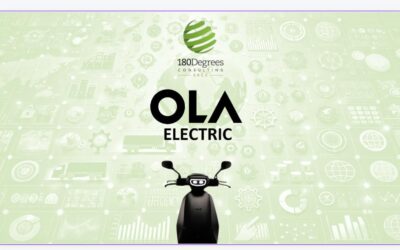Quizzicle
Quizzicle, our newest initiative focuses on testing your consulting and analytical skills.
Put your best foot forward and unlock your potential.
We upload new quizzes every Monday!
expert
InsightOps : Ola Electric
This edition of InsightOps dives deep into Ola Electric’s supply chain strategy, exploring the innovative approaches that can enable it to navigate complex logistics and scale production in a rapidly evolving EV market. This edition unpacks Ola’s tactics in localizing production, optimizing supplier networks, and managing distribution challenges to drive sustainable growth in electric vehicle market. A must-read for those fascinated by the intricacies of supply chain innovation, operational resilience, and the future of electric mobility.
Boeing
Exploring Boeing’s leadership in the aerospace industry through a comprehensive value chain perspective. From advanced manufacturing capabilities to extensive global supplier networks, analyzing how the company converts raw materials into innovative commercial aircraft and sophisticated defense systems in a highly competitive aviation landscape.
The number of Call of Duty Matches played over a random weekend in India
Let’s guesstimate the number of call of duty matches played over a random weekend in India
ADVANCED
InsightOps : Ola Electric
This edition of InsightOps dives deep into Ola Electric’s supply chain strategy, exploring the innovative approaches that can enable it to navigate complex logistics and scale production in a rapidly evolving EV market. This edition unpacks Ola’s tactics in localizing production, optimizing supplier networks, and managing distribution challenges to drive sustainable growth in electric vehicle market. A must-read for those fascinated by the intricacies of supply chain innovation, operational resilience, and the future of electric mobility.
Boeing
Exploring Boeing’s leadership in the aerospace industry through a comprehensive value chain perspective. From advanced manufacturing capabilities to extensive global supplier networks, analyzing how the company converts raw materials into innovative commercial aircraft and sophisticated defense systems in a highly competitive aviation landscape.
The number of Call of Duty Matches played over a random weekend in India
Let’s guesstimate the number of call of duty matches played over a random weekend in India
INTERMEDIATE
InsightOps : Ola Electric
This edition of InsightOps dives deep into Ola Electric’s supply chain strategy, exploring the innovative approaches that can enable it to navigate complex logistics and scale production in a rapidly evolving EV market. This edition unpacks Ola’s tactics in localizing production, optimizing supplier networks, and managing distribution challenges to drive sustainable growth in electric vehicle market. A must-read for those fascinated by the intricacies of supply chain innovation, operational resilience, and the future of electric mobility.
Boeing
Exploring Boeing’s leadership in the aerospace industry through a comprehensive value chain perspective. From advanced manufacturing capabilities to extensive global supplier networks, analyzing how the company converts raw materials into innovative commercial aircraft and sophisticated defense systems in a highly competitive aviation landscape.
The number of Call of Duty Matches played over a random weekend in India
Let’s guesstimate the number of call of duty matches played over a random weekend in India
NOVICE
InsightOps : Ola Electric
This edition of InsightOps dives deep into Ola Electric’s supply chain strategy, exploring the innovative approaches that can enable it to navigate complex logistics and scale production in a rapidly evolving EV market. This edition unpacks Ola’s tactics in localizing production, optimizing supplier networks, and managing distribution challenges to drive sustainable growth in electric vehicle market. A must-read for those fascinated by the intricacies of supply chain innovation, operational resilience, and the future of electric mobility.
Boeing
Exploring Boeing’s leadership in the aerospace industry through a comprehensive value chain perspective. From advanced manufacturing capabilities to extensive global supplier networks, analyzing how the company converts raw materials into innovative commercial aircraft and sophisticated defense systems in a highly competitive aviation landscape.
The number of Call of Duty Matches played over a random weekend in India
Let’s guesstimate the number of call of duty matches played over a random weekend in India


